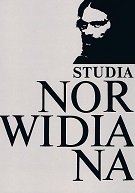La Comtesse Laura Czosnowska ou le Malheureux Destin D'une Lionne
Contess Laura Czosnowska or the Unhappy Fate of a Certain Lioness
Author(s): Emmanuel DesurvireSubject(s): Literary Texts
Published by: Towarzystwo Naukowe KUL & Katolicki Uniwersytet Lubelski Jana Pawła II
Keywords: Laura Czosnowska; Edmund Chojecki; Cyprian Norwid; biography; Polish emigration in France; Polish-French relations in the 19th century
Summary/Abstract: 1. The aim of the article is to reconstruct the biography of Countess Laura Czosnowska, the daughter of Colonel Franciszek Górski, who was generally considered one of the Warsaw socialites at the beginning of the 1830s (calling Laura a “Lioness” the author makes an allusion to Stanisław Bogusławski’s play Lions and Lionesses of 1846). 2. Countess Czosnowska’s history is a streak of painful and unhappy events. Her first marriage to Captain Janusz Czosnowski, an officer of the Polish Army, that was concluded on 16 December 1830, ends in dramatic circumstances with the husband’s suicide (he suspected his wife of a romance with her step-brother, Józef Poniatowski – a natural son of Józef Antoni Poniatowski and Zofia Oborska). After this event Laura takes refuge in the palace of her mother, the wife of General Dziekoński, in Hieronimowo, where she brings up Michalina Dziekońska (later to be Zaleska). There, by accident, she contributes to the death of Michalina’s father, Michał Dzieko_ski, Mrs Dzieko_ska’s brother-in-law. A series of traumatic events results in Laura moving to Paris – and this is the beginning of the second stage of her life 3. In the capital of France the woman makes Karol Edmund Chojecki’s acquaintance – in the circle of their mutual acquaintances the author mentions Maria Kalergis, Fryderyk Chopin and Cyprian Norwid. From Laura and Karol Chojecki’s relationship Maria was born in 1847 – and Karol admitted his fatherhood at once, however, Laura (influenced by Mrs. Dziekońska) tried to hide the fact of the birth, as she was afraid of a scandal. Czosnowska also did not even think about marrying Chojecki, as it would be seen as a misalliance. As a result of Mrs. Dziekońska’s intrigues Karol lost contact with his daughter; to make things worse he was forced to leave France for political reasons (he was involved in the activities of Pierre-Joseph Proudhon’s “Voix du Peuple” and of Adam Mickiewicz’s “Trybuna Ludów”). After a year’s stay in Egypt Chojecki comes to Nice; soon he also obtains a residence permit and he regains his child. The little Maria is placed in a boarding house in Neuilly, then she continues her education in Switzerland, and when she is seventeen she returns to Paris and on 12 September 1856 marries a young captain, Edmond Bureau. So the relation between Laura Czosnowska and Karol Edmund Chojecki – like her first marriage – ends in dramatic circumstances.
Journal: Studia Norwidiana
- Issue Year: 2014
- Issue No: 32
- Page Range: 207-231
- Page Count: 25
- Language: French

